A film type heater is a heating device that distributes heat through infrared rays. The device has the form of a thin film of different sizes with a heating element and foil inside. According to the principle of execution are divided into: wall, ceiling and floor. Such a device is suitable for any room, as it can work even at a temperature of -30 degrees. The main plus of such a heater is that it can be purchased not only in the form of a monophonic film, but also depict on it various illustrations that complement the interior of any room.
Device and principle of operation
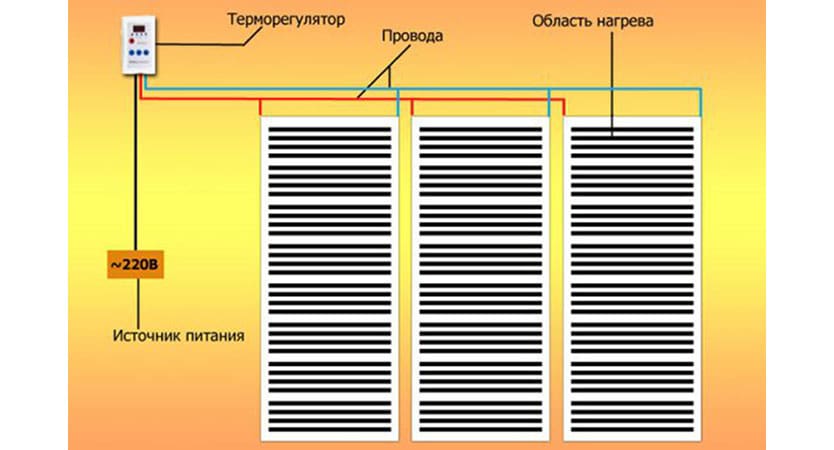
This device for heating is made of two heat-resistant films, between which there is a heating element. And also most models are equipped with a temperature controller that allows you to control the temperature of the device and special sensors that will turn off the device if the set temperature is reached in the room.
The principle of operation of infrared heaters is that infrared rays do not heat the air itself, but the objects and surfaces that they encounter, and these objects, in turn, already spread heat throughout the room. By the same principle, the sun warms the planet.
![]() See also - Infrared heaters harmful or not
See also - Infrared heaters harmful or not
Types of infrared film heaters
According to the installation method, the flexible film heater for the house can be floor, ceiling and wall. The latter type of heater is recommended to be used more as a decoration or as an additional heat source than as a full-fledged heating device, since the radiated heat will quickly go to the ceiling, which is not very effective. Therefore, if you have to purchase a device specifically for heating a room, then you need to choose a ceiling or floor option.
Ceiling mounted
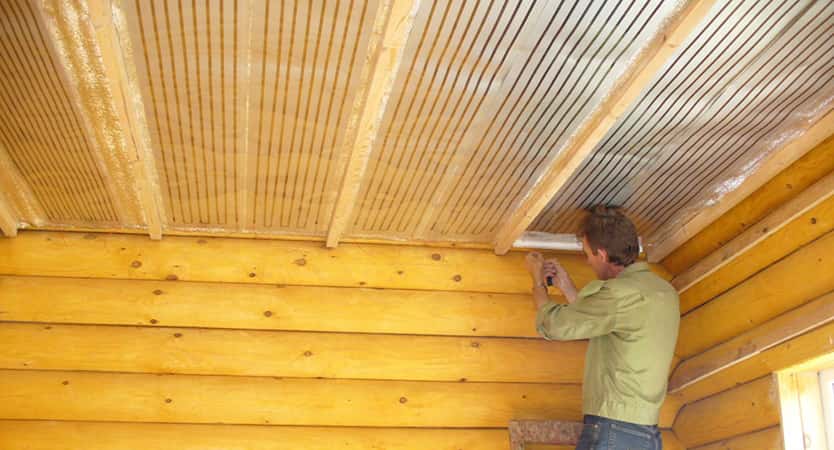
This type of film heater is most often chosen by customers, since it most effectively distributes heat throughout the room. This happens because infrared rays quickly reach the floor, give off heat to other objects and air, and then again go up, which gives the effect of volumetric heating. However, it is worth considering that in spite of all its advantages, if the room has ceilings above three meters, then infrared rays cannot reach the floor, which, accordingly, makes its installation on the ceiling pointless, and it is worth considering the floor version.
Floor
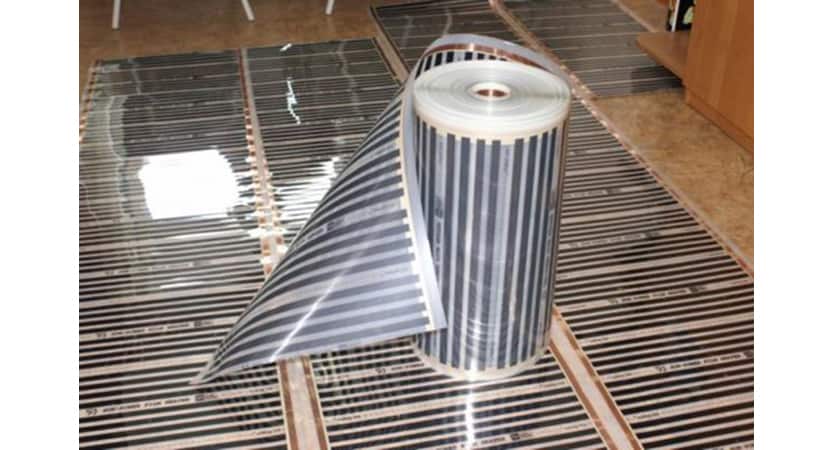
A floor-mounted film heater has even more advantages over the ceiling view of such a device. The ceiling height is no longer important here, since few buyers are interested in a warm ceiling, but a warm floor always adds comfort to the room. But still, it is risky to put a film heater on the floor, if you plan to equip the room with too heavy furniture or appliances - there is a high risk of a breakdown of the device under their weight.
![]() See also - How to connect a temperature controller to an infrared heater
See also - How to connect a temperature controller to an infrared heater
Advantages and disadvantages of a film infrared heater
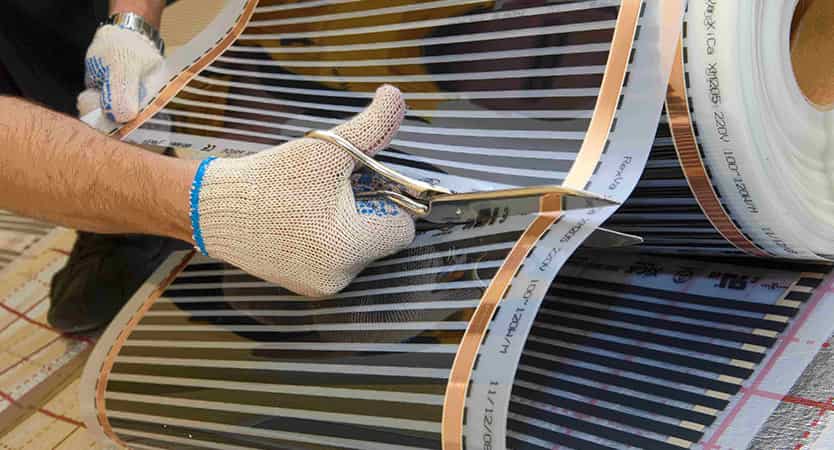
The main advantage of a film heater over other types of heating devices is that it does not heat up to high temperatures, therefore, you can not be afraid of accidental burns or fires. Other benefits include:
- long term of operation;
- energy efficiency;
- ease of installation;
- silent operation;
- made from environmentally friendly components;
- the device does not pollute or dry air.
Buyers also note that being under the infrared rays of the heater gives the same relaxing effect as being under the Sun.
The device is still not perfect and has several disadvantages:
- the room will quickly cool after turning off the device;
- not too strong heating - the room will be comfortable, but not warm;
- ceiling models can overheat household appliances;
- a wall heater is not effectively used as a full-fledged heating device.
![]() See also - How to choose the perfect air conditioning for home and apartment
See also - How to choose the perfect air conditioning for home and apartment
Mounting an infrared film heater
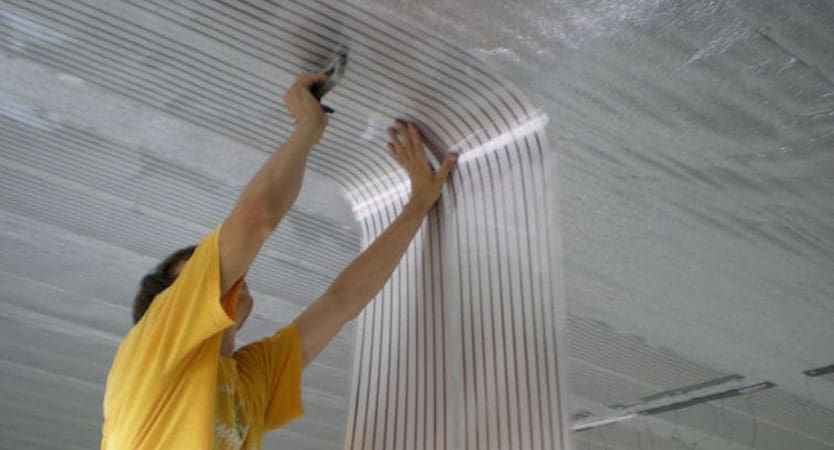
The film heater is installed in a slightly different way than other types of heating appliances, however, this can be done independently, it is not necessary to resort to the help of specialists. The main thing to remember is that the heater cannot be turned on while the film is in the rolled state, the distance between the films should be no more than 4 mm and the film can be cut only along the lines left by the manufacturer. To install a heater, you must adhere to the following sequence of actions:
- Reflective screen mount.
- Film installation.
- Sealing with aluminum adhesive foil.
- Installation of heating elements.
- Turn on the device.
And also, all manufacturers of film heaters prohibit fixing the device with nails and self-tapping screws. It is only necessary to fix the device with a construction stapler.
See also:
- 12 best home heaters according to buyers
- 18 best Timberk heaters of the year
- 20 best Ballu heaters years according to buyers
- 5 best Stiebel Eltron heaters of the year
- 5 best digital weather stations for the home of the year


